The letter of recommendation is a formal document designed to validate a student’s application for a law program or law school.
It also provides additional positive details about the student’s performance, qualities, and personality. It should be written by an individual who knows the student and, therefore, is aware of his or her strengths and skills. The writer should also provide positive feedback on the student’s academic evaluation in upper-division classes. A recommender may also have evaluated the student’s job or internship. This ensures that the writer has personally observed the qualities and experiences that he/she writes about, therefore ensuring that his/her recommendation is valid.
The following individuals are therefore suitably positioned to write a letter of recommendation:
- Faculty members
- Professors and GSIs
- Teacher’s assistant
- Employer/work supervisor who has directly interacted with the student can personally vouch for the student’s potential as a good law student.
There are, however, individuals or writers that may detrimentally affect a student’s chances, and hence it is recommended that they steer away from writing a letter of recommendation. They include:
- Family
- Friends
- Political figures
- Judges
- Any professional outside the university setting
Free Templates
Unlock your potential with the free templates provided below. Craft compelling letters that impress admissions committees and maximize your chances of acceptance.
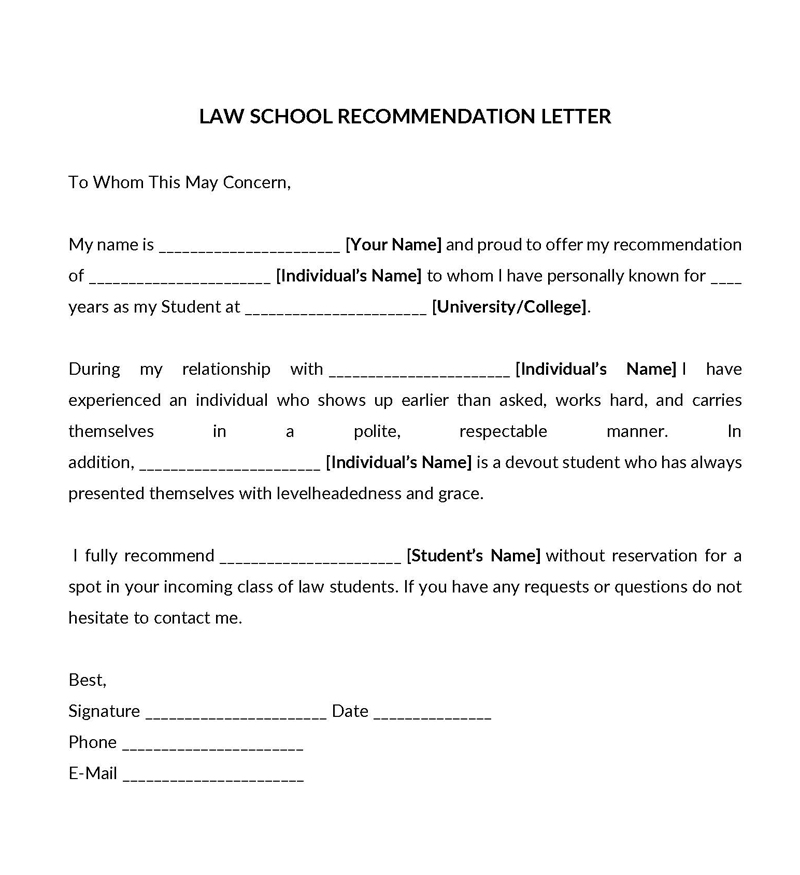
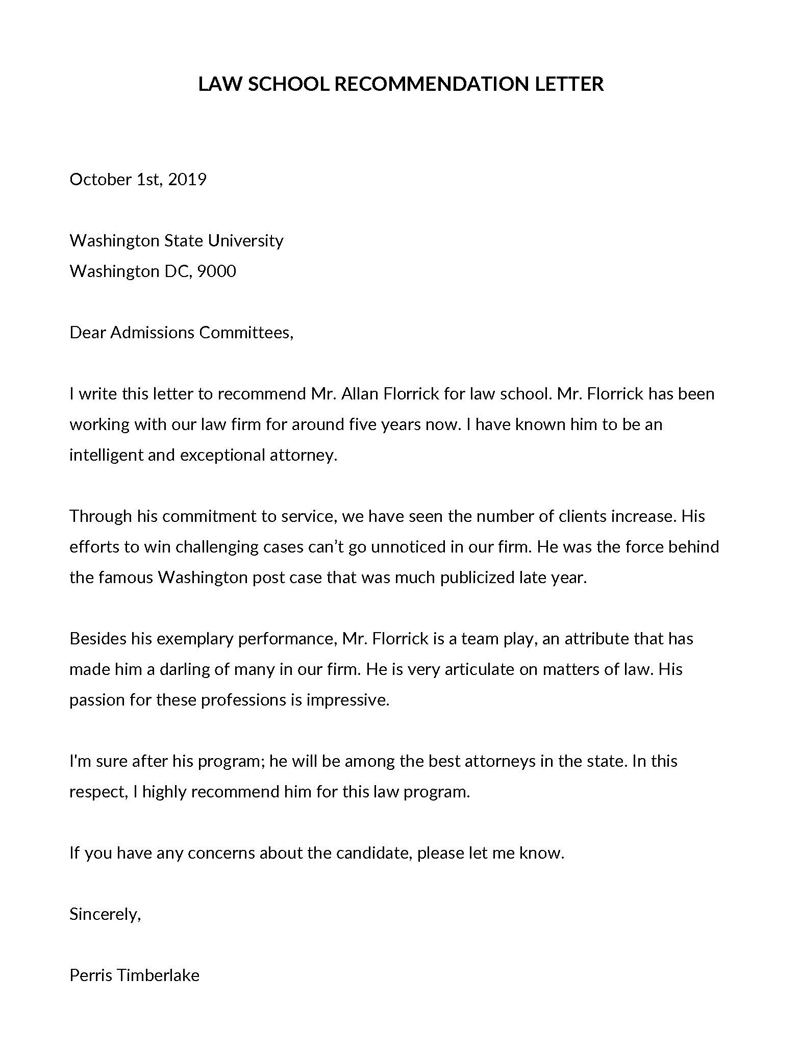
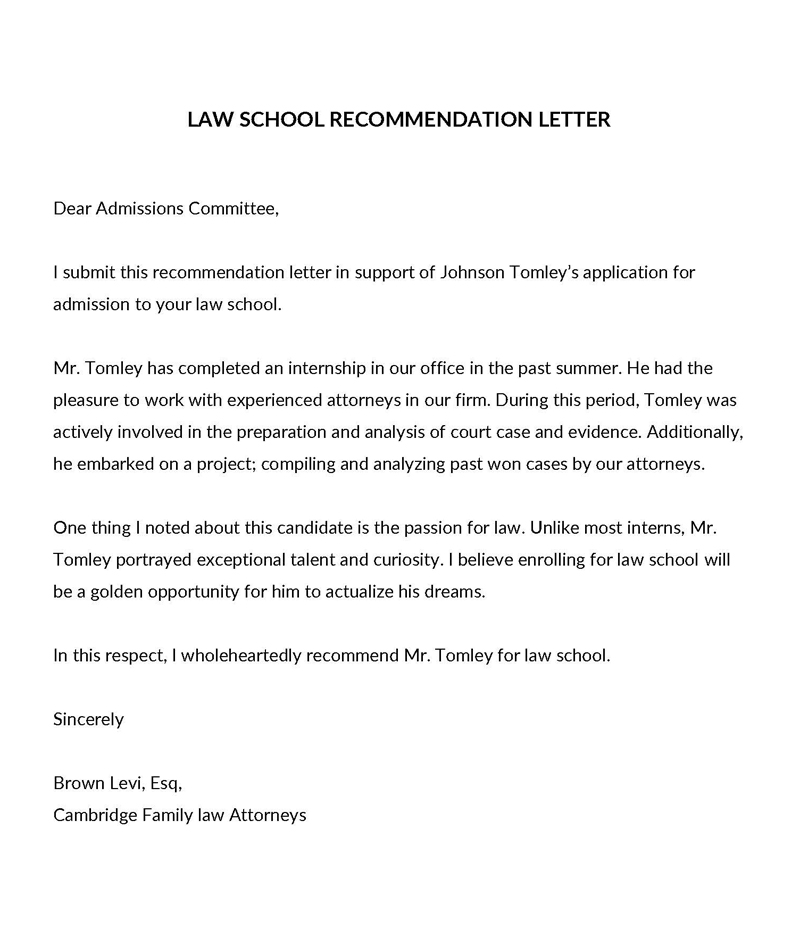
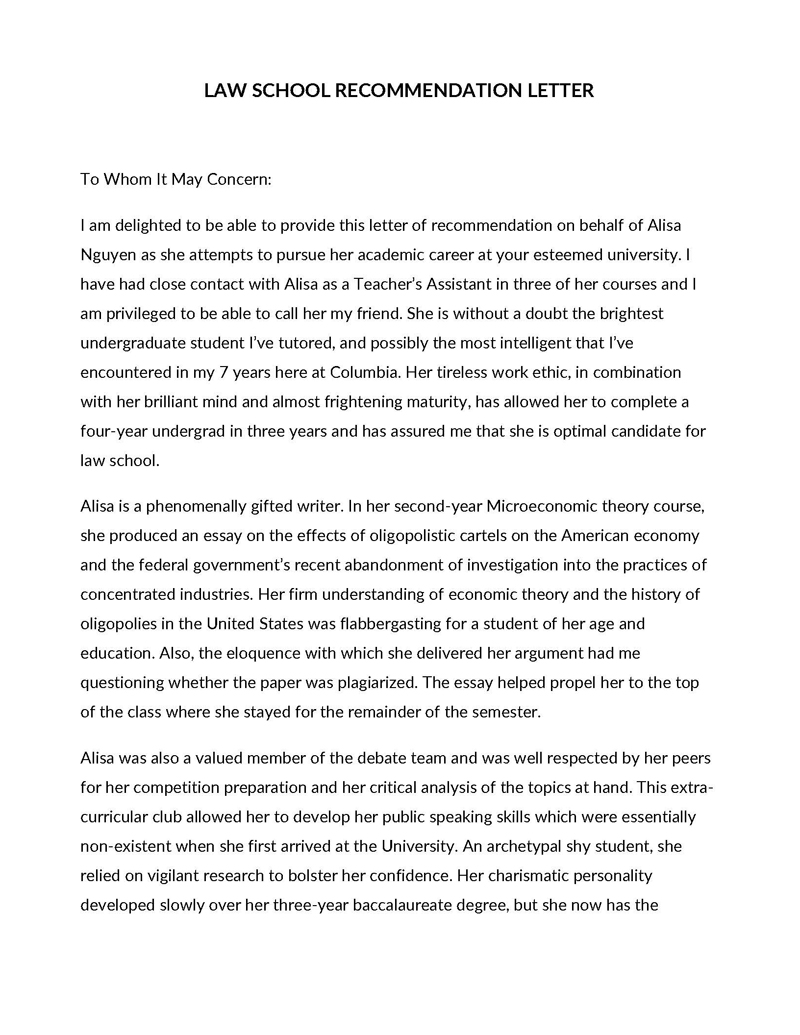
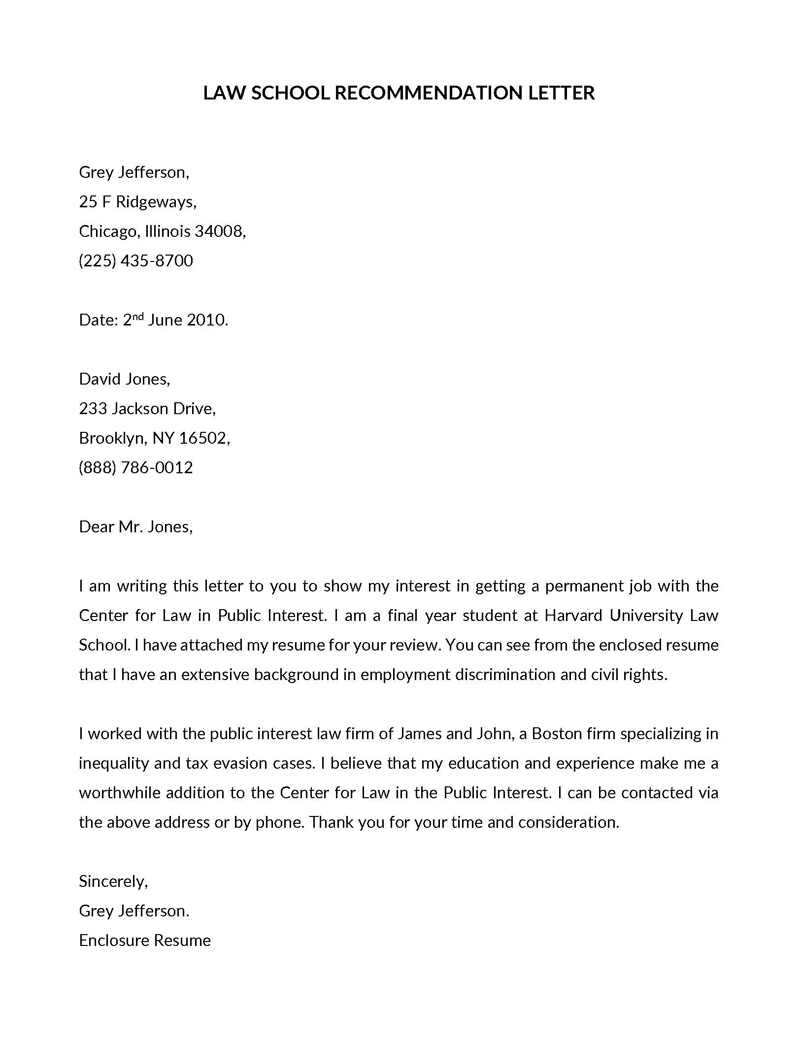
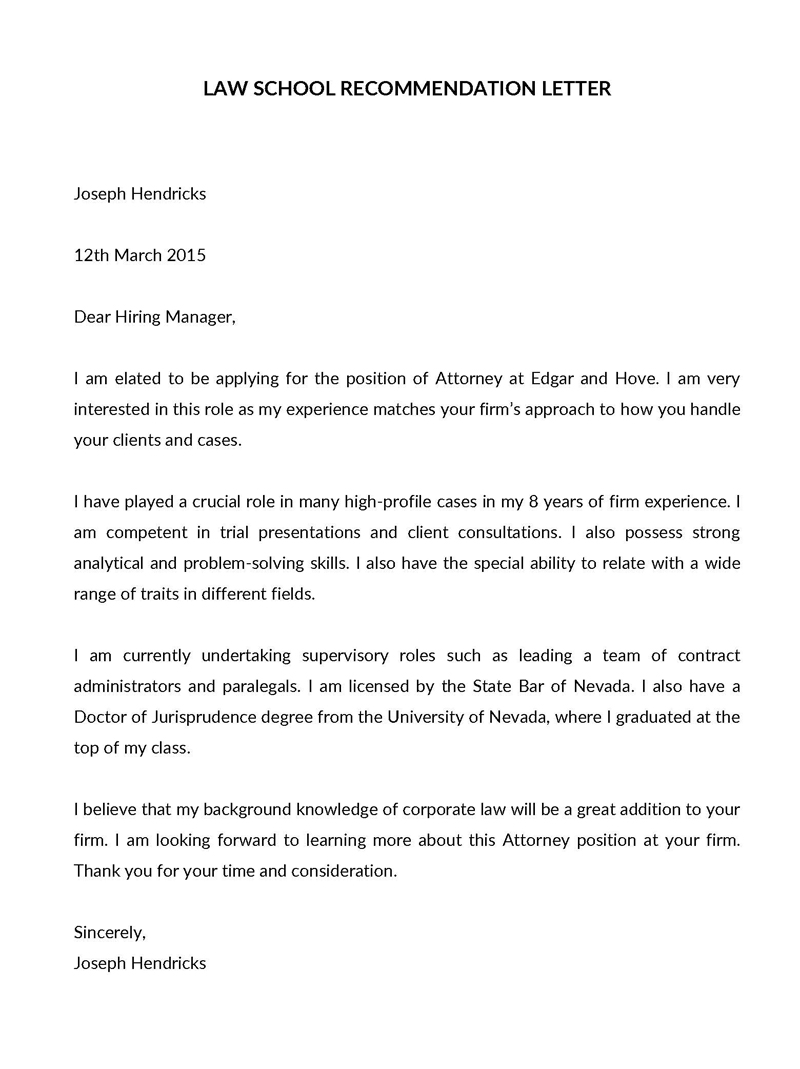
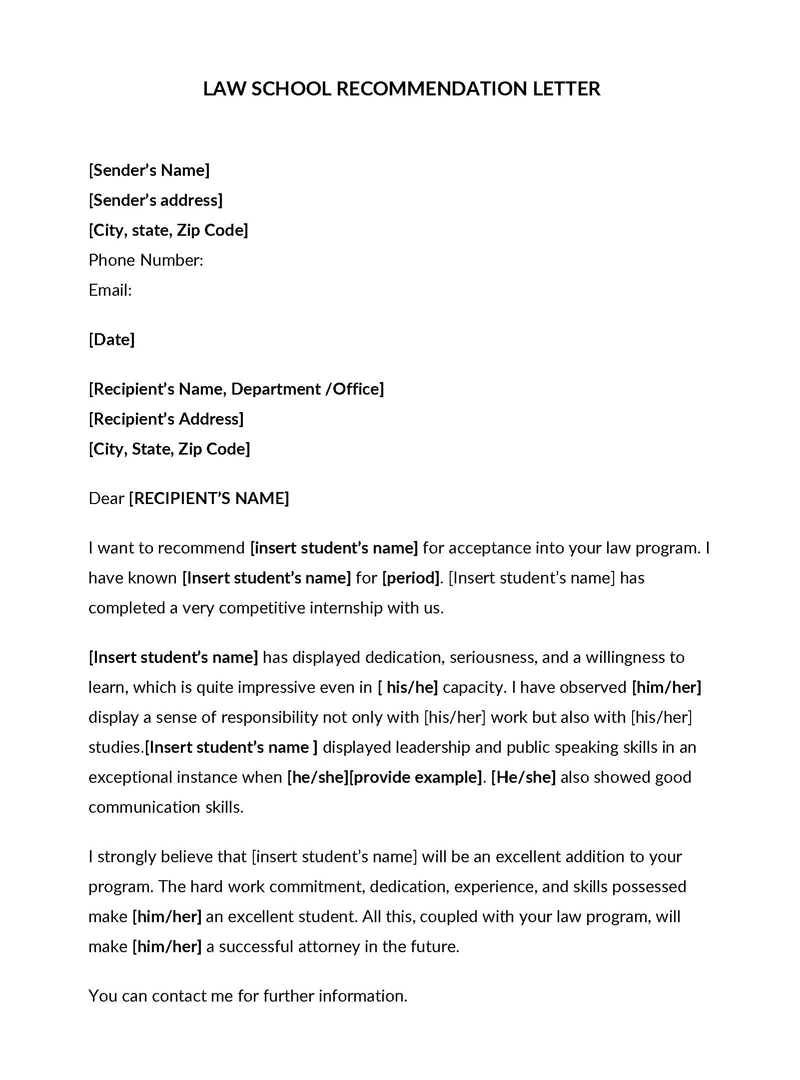
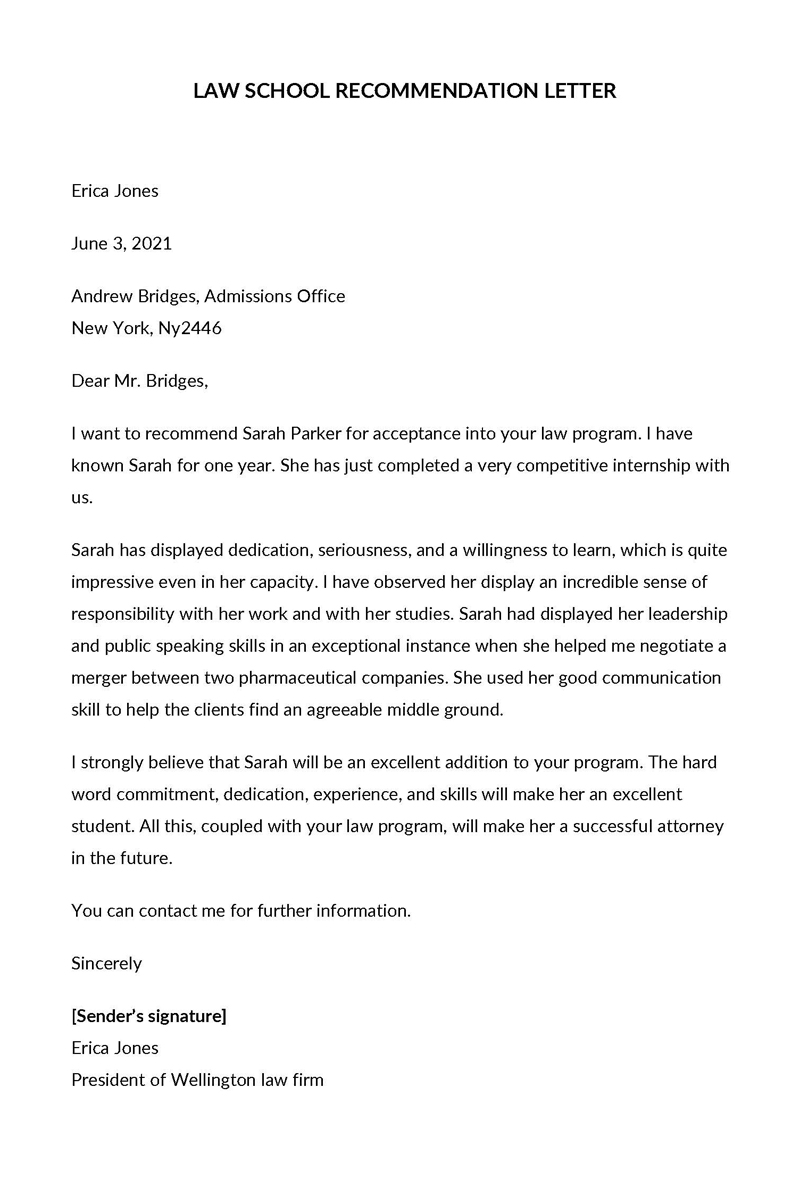
How to Write
A letter of recommendation is written to increase a student’s chances of being accepted to a law school or program; therefore, the recommender should have all the necessary information to enable him to draft a compelling letter.
The recommender should ensure the following during the writing process:
Section 1: Collect information from the student
A recommender should start by assembling information about the student and the opportunity he/she is applying for. This will help the recommender better understand the student as a person and professional. The student should therefore provide the recommender with the following information:
Cover note
The student should provide the recommender with his/her cover letter, which contains information on how the writer can contact the student in case they need to reach out, what the student would like emphasized in the law school letter of recommendation, a list of schools the student is applying to and the earliest dates their application information is required, any other relevant information and a note to the writer of the recommendation emphasizing the importance of the recommendation for the student’s professional future/career.
Recommendation forms
The recommender should also request recommendation forms from the student to enable him/her to complete the student’s application information promptly and provide his/her name, title, and contact information (phone number, email, etc.). This also ensures that the writer uses his/her official forms found on the LSAC website, especially if the student is using CAS.
Academic summary
The student should provide the recommender with an informal transcript. The transcript contains courses, tutorials, or extracurricular activities in which the recommender and the student worked together. This provides the recommender with an overview of the student’s academic performance.
Personal statement
The recommender should also request a personal statement from the student. This helps the recommender combine his/her knowledge of a student’s academic background with personal information, including the student’s goals and ambitions about getting admission to the law program/school.
A copy of the student’s best work
A copy of the student’s best work, as assessed and estimated by the recommender, should be provided. This can include lab evaluations, projects, and publications. This increases the credibility of the letter because the recommender can demonstrate that he/she has interacted with the student in an academic capacity.
Resume/ CV
The recommender should request and obtain a copy of the student’s resume/CV. This enables the recommender to ensure that the student’s resume/CV and the letter of recommendation complement each other. It also ensures that the recommender does not seem to be repeating what is contained in the resume/CV, which can annoy the recipient.
Section 2: Write the Letter
A well-drafted and formatted letter should eloquently convey information and facts. Therefore, the recommender must undertake the writing process in a well-thought-out manner.
He/she should ensure that it contains the following:
Letterhead
The letterhead should be written depending on whether the recommender is sending an email or a hard copy. However, regardless of the method used to send the letter, the following information should be provided:
Your name
The name of the recommender must be provided on the letterhead. This ensures that the recipient knows who wrote the recommendation on behalf of the student. Suppose the recommender is writing an email, then he/she should ensure that the subject line reads ‘Recommendation -First Name and Last Name. This ensures that the letter is not received as spam mail.
Contact information
The recommender should provide his or her contact information to ensure that the recipient can contact him/her when the need arises. However, if the recommender is writing an email, he/she should ensure the contact information follows the closing or signature. This is because it is easy to lose the attention of the recipient/reader with an email; as such, it is best to get straight to the point at the beginning of the letter of recommendation.
Date
A hard copy should contain a date. This informs the recipient/reader of when the letter was written. The date also helps the reader discern if the letter was written past the submission date; therefore, he/she can decide if it should be disregarded on that account.
Recipient’s details
The letterhead should also contain the recipient’s details. This should include the recipient’s name, his/her office or department, and address information. However, if the recommender is sending an email, then the recipient’s details are not required as the letter of recommendation will be sent directly to him/her.
Salutation
The recommender should use a salutation that addresses the recipient directly.
EXAMPLE
Dear Mr./Ms. Last Name
Suppose the recommender has not been informed of the recipient’s name by the student or from his /her research, then the recommender can address the letter to the academic department with a general salutation written as ‘To Whom It May Concern.’
Section 3: Introduction
A strong introduction should be written to enable the recommender to catch the reader’s attention. Therefore, the recommender should ensure that the introduction contains the following:
Introduce yourself
The recommender should start the recommendation letter by introducing himself /herself to the reader. This ensures the reader is familiar with the writer of the letter of recommendation.
Describe your relationship with the student
The recommender should also describe the type of relationship he/she has with the student and its duration. This enables the writer to show how he/she relates to the student, demonstrating why he/she is the best person to write the letter.
Briefly state the qualifications of the student
Include a brief mention of the student’s qualifications, including training and seminars that the student has attended. This brief mention in the introductory paragraph can render the reader curious about what more the student has to offer; hence, he/she will be hooked on reading the rest.
Section 4: Body
The body should further detail the student’s qualifications, skills, and achievements. It is therefore important that the recommenders provide the following information:
State your reasons for the recommendation
The recommender should start the body by explaining why he/she believes the student should be considered for the program. This is the writer’s chance to demonstrate how the student stands out from other students who may also be interested in getting admission into the law school or other students with whom he/she has interacted.
Student’s skills and achievements
The recommender should also mention the student’s skills and achievements in the body of the letter. This shows that the student can handle the workload he/she is likely to get in the program. Stating the student’s achievements also shows that the student is determined and driven to accomplish his /her goals.
Include examples
The recommender should provide examples that show that the student possesses characteristics of a lawyer, such as good judgment, knowledge of the law, creativity, willingness to listen, etc. This helps demonstrate that the student has qualities that deem him/her as a future lawyer.
Mention the student’s effective communication ability in writing
A student aspiring to work in the legal field must possess good communication skills due to the legal arguments he/she will be required to make. The recommender must therefore mention the student’s ability to communicate clearly and effectively in writing.
Highlight students’ leadership and public speaking skills
The recommender should also mention the student’s leadership and public speaking skills. This helps to call attention to specific valuable skills that the reader/recipient is likely to be interested in or looking for. It also helps the recommender indicate that the student is confident and headstrong.
Section 5: Conclusion
The conclusion provides the recommender with the last chance to make a good impression on the student. Therefore, the recommender must include the following information:
Restate your admiration and support
The recommender should restate his/her admiration for the qualities processed by the student. However, the recommender should avoid being too positive. This can make the reader cynical about the information provided, as he/she has likely dealt with students.
Summarize the statements made above
The recommender should provide a summary of the letter. This enables him/her to emphasize the qualities possessed by the student, reminding the reader once more that the student should be considered for the program.
Provide contact information for follow-up
The recommender should provide his/her contact information in the conclusion of the letter if it is an email. However, if it is a hard copy, it is standard practice to omit it, as he/she is likely to have already provided it on the letterhead. In either case, the recommender must offer to answer any questions or clarify any information for the reader if the need arises.
Sign-off
Finally, the recommender should conclude the letter with an appropriate word or phrase, such as sincerely. This demonstrates attention to detail along with adherence to business etiquette.
note
An individual writing a letter of recommendation should be aware that it is critical in determining whether the student will be accepted into the law school. Therefore, the recommender should be ready to provide a good commendation based on what he/she knows about the student. If the recommender feels that he/she cannot sufficiently provide a good recommendation, then he/she should turn down a request to write it.
Law School Letter of Recommendation Samples
The following section presents a pair of thoughtfully composed letters of recommendation. Each letter reflects the author’s genuine assessment of the candidate’s abilities and potential, offering a comprehensive glimpse into the applicant’s academic and professional merits.
Sample 1
Dear Admissions Committee,
I am Professor Katherine Anderson, a Professor of Political Science at ABC University. It is my pleasure to introduce myself and recommend Alex Turner, a student whom I have known for the past three years as her professor and mentor in our university’s Moot Court team. Alex’s academic rigor and leadership in legal-related activities at our university make her an outstanding candidate for your law program.
I wholeheartedly recommend Alex for admission to your law school. She has exhibited exceptional analytical skills and a deep understanding of legal principles through her coursework and extracurricular activities. Her notable participation in advanced legal seminars and her leadership in organizing our Annual Legal Symposium demonstrate her commitment and potential in the legal field.
Alex’s academic prowess is further highlighted by her winning the Best Advocate Award in the National Moot Court Competition. Her written legal arguments are not only persuasive but are also a testament to her excellent communication skills, which are crucial for a successful legal career.
Additionally, Alex’s tenure as President of the Student Legal Society showcased her leadership and public speaking abilities, equipping her with skills essential for navigating the challenges of law school and beyond.
In summary, Alex Turner possesses the intellectual capacity, motivation, and ethical grounding ideal for a promising law student. I am confident she will be an asset to your program and the legal profession.
For any further information, feel free to contact me at [Contact Information].
Sincerely,
Professor Katherine Anderson
[Your Signature]
Sample 2
Dear Admissions Committee,
I am Senior Partner Jonathan Harrison, a Senior Partner at XYZ Law Firm and an adjunct professor at DEF University. I am writing to endorse Olivia Parker, a student and intern under my guidance for the past two years. Olivia has consistently demonstrated a strong aptitude for legal studies and an unwavering commitment to pursuing a career in law.
I strongly recommend Olivia for admission to your law school. Her analytical skills, evidenced through her work on complex legal cases during her internship and her insightful academic contributions, make her an exemplary candidate for legal studies.
Olivia’s involvement in legal workshops and her contributions to our firm’s legal publications highlight her proactive approach and dedication to the field of law. Her ability to clearly articulate legal arguments in writing and her capacity for critical thinking are assets that will serve her well in law school and her future legal career.
Furthermore, Olivia’s leadership skills, demonstrated through her role in organizing legal seminars at our university, along with her public speaking abilities, are indicative of her potential to thrive in the dynamic environment of law school.
To conclude, Olivia Parker is an exceptional candidate whose academic abilities, practical legal experience, and personal qualities make her ideally suited for your law program. I am confident that she will excel and contribute meaningfully to your academic community.
Please contact me at [Contact Information] for any additional information.
Sincerely,
Senior Partner Jonathan Harrison
[Your Signature]
Analysis
The provided letters offer effective guides for composing similar documents with a clear and formal structure. The introductions succinctly establish the recommender’s identity, position, and connection to the student, stating the purpose of the letter.
Secondly, the letters stand out with specific details and examples that vividly illustrate the students’ qualifications. Incorporating examples like participation in Moot Court or winning the Best Advocate Award adds credibility and depth. Moreover, the content is tailored to each student, emphasizing their unique strengths, making the letters compelling for law school admission.
Lastly, the recommendations express unwavering confidence in the students’ potential for success. The letters highlight academic achievements, analytical skills, and extracurricular involvement, projecting a holistic view of the students’ capabilities. Positive language in the conclusions reinforces the idea that the students will thrive academically and contribute meaningfully to the law school community. Inclusion of contact information provides a practical means for the admissions committee to seek additional information, enhancing overall credibility.
Free Template (Text-form)
After providing you with templates of a recommendation letter in different formats, we are providing you with a text-based template below for instant use.
Law School Letter of Recommendation Template
[Sender’s Name]
[Sender’s address]
[City, State, Zip Code]
Phone Number:
Email:
[Date]
[Recipient’s Name, Department /Office]
[Recipient’s Address]
[City, State, Zip Code]
Dear[RECIPIENT’S NAME]
I want to recommend [insert student’s name] for acceptance into your law program. I have known [Insert student’s name]for[period].[Insert student’s name] has completed a very competitive internship with us.
[Insert student’s name] has displayed dedication, seriousness, and a willingness to learn, which is quite impressive even in[ his/he] capacity. I have observed [him/her] display a sense of responsibility not only with [his/her ] work but also with [his/her] studies.[Insert student’s name] displayed leadership and public speaking skills in an exceptional instance when [he/she][provide example].[He/she] also showed good communication skills.
I strongly believe that [insert student’s name] will be an excellent addition to your program. The hard word commitment, dedication, experience, and skills possessed make[him/her] an excellent student. All this, coupled with your law program, will make [him/her]a successful attorney in the future.
You can contact me for further information.
Sincerely
[Sender’s signature]
[Sender’s Name]
[Title]
Tips to Follow
A letter of recommendation should effectively convince the reader to consider the student for the program. However, these essential tips will help the recommender ensure that it has the desired effect.
These include:
Ask for information before the time
The recommender should request that the student provide him/her with information before writing the letter. This is especially important when the recommender does not recall the student. Asking for information ensures that the recommender can provide adequate and relevant information concerning the student.
Follow the deadline
The letter of recommendation should be sent and received on or before the application submission deadline date. This ensures that the recommender is not viewed as unprofessional, resulting in the recipient/reader disregarding the recommendation and lowering the student’s chances of admission to the law school.
Keep it positive
The letter of recommendation confirms a recommender’s belief in the student. Therefore, the information provided should be positive. This helps ensure that the information has a favorable impact on how the reader perceives the student.
Be subjective
The recommender should avoid using clichés and generalized language, which makes it seem as though the student is unknown to him/her. This may lead to the admissions council believing that the recommender is not confident about the recommendation.
Focus on the attributes that matter to law schools
The recommender should focus on attributes that matter to the law school. The attributes can be identified by researching what the school is looking for or inquiring from the student. This helps to show that the student meets the required criteria.
The most common skills include:
- Writing skills
- Communication
- Organization
- Critical thinking
- Integrity
- Logical thinking skills
Frequently Asked Questions
The letter of recommendation plays an important role in enabling a recommender to strengthen a candidate’s application. A recommender can share an applicant’s academic, personal, and social skills with the institution or job the candidate is applying for.
A student should inform the recommender of the number of recommendation letters requested by the institution he/she is applying to. In most cases, a recommender may be required to write at least two to three letters. A recommender can provide an additional letter with new information not mentioned in the other letters to further support the application.
A recommender should inquire about whether the law school prefers a confidential recommendation letter. Confidential letters cannot be seen by the student or applicant. Most schools prefer confidential letters to enable the recommender to provide an open and honest recommendation.












